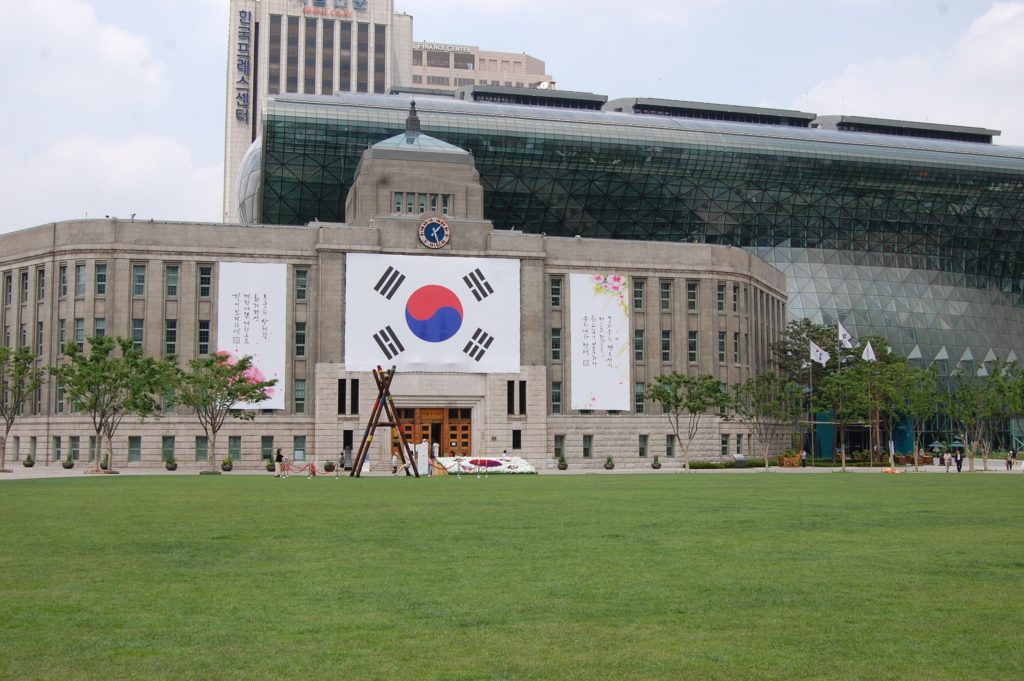The Peninsula
South Korean General Elections: Outlook for the Seoul, Gyeonggi Province, and South Gyeongsang Province Elections
Published June 12, 2018
Category: South Korea

By Jun Young (James) Park
On June 13, local elections in South Korea will be held for about 4,000 local administrative, legislative, and educational leaders in 17 major cities and provinces. The Democratic Party of Korea (DPK) is predicted to dominate in fourteen of them.
The approval rate of President Moon Jae-in and his administration has been above 70% for the past few months, and has seemingly translated into massive public support for DPK candidates for the upcoming elections. According to a recent survey, 52% of South Koreans are known to favor the DPK, 18.5% support the conservative Liberty Korea Party (LKP), 6.6% for the Bareunmirae Party, and 7.7% for the Justice Party. In South Korea, where the land is small, but population density is high, local elections can be as important as presidential elections. Local policies can have direct and immediate impacts on the daily lives of citizens, and the implementation of local policies is highly dependent on the leadership of mayors and governors. As usual, major regions like Seoul, Gyeonggi, and South Gyeongsang have received a lot of attention from the general public, but for various reasons in this year’s case.
The Seoul mayoral election traditionally has been regarded as the highlight of South Korean local elections. This year, the Seoul mayoral election presents high-profile candidates, as the race has shaped up as a three-way competition among Park Won-soon of the DPK, Kim Moon-soo of the LKP, and Ahn Cheol-soo of the Bareunmirae Party.
The hottest issue of the Seoul Mayoral election has been whether Kim and Ahn will seek a single candidacy or not. Incumbent Mayor Park Won-soon of the DPK, aiming for his third term, has been ahead of Kim and Ahn with 56.1 % of Seoul citizens supporting his mayorship, while Kim and Ahn’s support rates are only 15.8% and 14.9%. Many people expressed skepticism towards Kim and Ahn’s possible merger as their combined approval rate is still significantly lower than that of Park. Both Kim and Ahn stated that neither would be willing to give up his candidacy, leading to a prediction that Park would easily outperform his rivals.
During the Seoul mayoral election debate, Park was harshly criticized by both Kim and Ahn for Seoul’s increasingly devastating air pollution and the issue of reconstructing old, impoverished areas, which have been problematic for multiple years during Park’s two terms as the mayor. On the other hand, Kim was condemned for his negative comments on the LGBTQ issue during the debate. Despite the LKP and Bareunmirae Party’s collaboration to downplay Park’s candidacy, the Seoul public’s support for Park remains sky-high.
The gubernatorial election of Gyeonggi Province, where more than twelve million people reside, is arguably the second most significant event of the local elections. This year, the Gyeonggi gubernatorial election is by far the most controversial of the elections, with negative campaigns targeting Lee Jae-myung, the DPK candidate. Similar to most regions, Gyeonggi Province has witnessed DPK dominance, with Lee’s support rate consistently being around 50% or above for the past couple months, and its counterpart Nan Kyung-pil of the LKP only receiving less than half of Lee’s support. As a way to decrease Lee’s support, Lee’s rivals including Nam and Kim Young-hwan of the Bareunmirae Party, have conducted negative campaigns in full swing, by addressing two notable scandals involving Lee: his verbal harassment of his brother and the brother’s wife in 2012 and his possible extramarital affair with an actress named Kim Bu-seon. While scandals involving Lee have been on the top news for many weeks, Lee seemingly has not been affected by them, as his support has not dropped.
The DPK’s exceptional performance in 2018 local elections is an anticipated outcome, but this year’s South Gyeongsang gubernatorial race might have been a surprise for the conservatives. Previously governed by the LKP’s current Chairman Hong Jun-pyo from the year of 2012 to 2017, South Gyeongsang Province traditionally has been regarded as a conservative stronghold. The two-way race between the DPK candidate Kim Kyoung-soo and the LKP candidate Kim Tae-ho, who already had been elected as the governor of South Gyeongsang for two terms from 2004 to 2010, was expected to be a close competition. On top of the LKP’s historical dominance in the region and Kim Tae-ho’s distinguished resume as a politician, the effect of the Druking Scandal, an online public opinion rigging scandal that Kim Kyoung-soo is alleged to be heavily involved led to the conservatives’ belief that they should at least be able to have a good run in South Gyeongsang. Unlike many conservatives’ wish and hopeful prediction, Kim Kyoung-soo, with his support in the mid-to-high 40%, has entirely led the competition between him and Kim Tae-ho. The nationwide dominance of the DPK, even in highly conservative regions like the South Gyeongsang not only shows South Koreans’ trust and favoritism towards President Moon, but is also a strong reminder of the public’s huge disappointment and antipathy towards the LKP in recent years.
Jun Young (James) Park is a graduate student in Asian Studies at the George Washington University. He is currently an Intern at the Korea Economic Institute of America. The views expressed here are the author’s alone.
Photo from Simon Williams-Im’s photostream on flickr Creative Commons.
